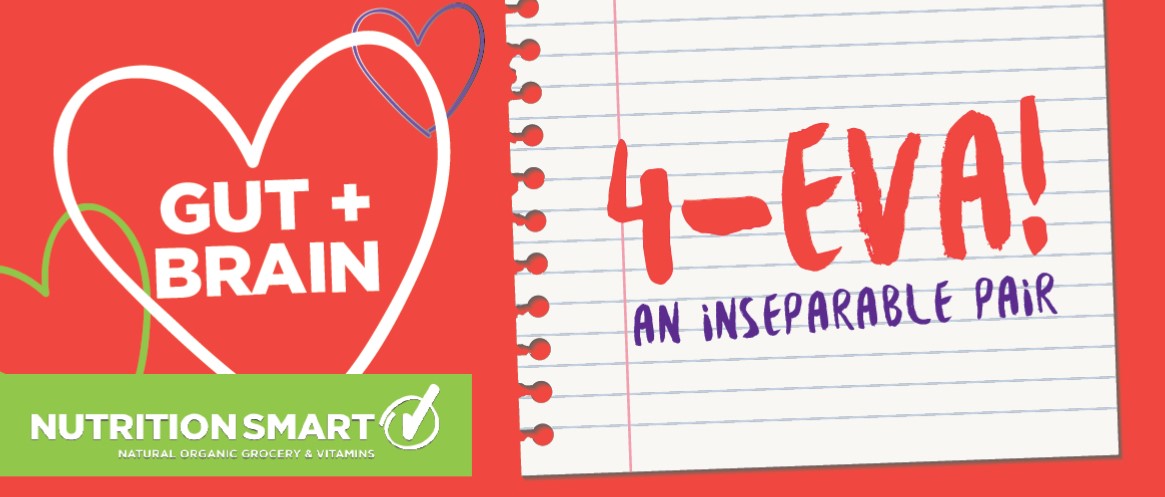
You may have seen the trendy words
probiotic,
gut-health and
microbiome floating around the internet recently or a quick scroll through your Instagram feed will show your favorite food blogger or yoga enthusiast gushing about the importance of your gut health for overall wellness. What does all of this mean exactly? And what the heck IS a microbiome anyways? Today we’re going with our gut (ha, ha) and sharing all the wonderful benefits of having a healthy digestive tract, which in turn, can help to boost your brain health too!
What Is Your Microbiome?
First things first, what exactly is our
gut microbiome and why is it SO important? Our gut microbiome, or
flora, is a complex community of microorganisms (like bacteria, viruses and fungi!) that coexist together in our gastrointestinal tract. These microorganisms, or microbes for short, play a crucial role in our health; they help with digestion, boosting our immune system and controlling and maintaining adequate brain function. Yep, you read that right; tiny organisms in your belly can help to regulate the health of your brain! With that being said, we can now start to piece together why taking care of our digestive tract has been a topic of interest recently. Providing your body with the right tools for a healthy, thriving microbiome can improve your overall health and who wouldn’t want that!?
The Gut-Brain Connection
Have you ever heard the sayings “gut feeling” or “butterfly’s in your stomach”? These two sayings both have to do with feelings (cognition) and your belly! These phrases suggest that there is indeed a link between your gut and your brain. Recent
research has found that your brain health can actually affect your gut health and vice versa. This communication and physical connection between your gut and brain is through millions of tiny nerves and it’s called the gut-brain axis. The
gut-brain axis links the emotional and cognitive parts of your brain with intestinal functions.
There’s a reason the gut has been called the “second brain”; our GI (gastrointestinal) tract produces many of the same neurotransmitters that our brain does! These neurotransmitters play a key role in the regulation of our mood. Remember all those microorganisms living together in our digestive tract? Well these microbes produce chemicals, like short chain fatty acids, that affect how our brain works! Short chain fatty acids can control the sensation of hunger, reducing our intake of food. It’s also estimated that 90% of serotonin (the happy hormone) is made in our digestive tract. So a happy gut can mean a happier you!
How to Support a Healthy Microbiome
What we’ve learned so far is that improving your gut health can in fact lead to a healthy brain. So, what are some ways to improve your gut health, you ask? We’re sharing a couple different ways to nurture your gut:
- Probiotics and prebiotics! Probiotics are live bacteria (sounds bad but we promise this is the “good” bacteria) that impart a wealth of health benefits if consumed! Prebiotics act as a “fertilizer” for the probiotics to thrive on. Supplementing with both can help with weight loss, digestive health, immune function and can even help improve some mental health conditions (like stress and anxiety). Here at Nutrition Smart, we have a ton of great probiotic supplements to get you (and your gut!) happy and healthy. You can also receive these all important probiotics through foods like yogurt, kimchi, sauerkraut, miso and kombucha.
- A diverse, nutrient-dense diet rich in omega 3’s, fermented foods, and high fiber.
- Limit your intake of processed foods and artificial sweeteners. These can stimulate growth of unhealthy bacteria in your gut, leading you to feel bloated and sluggish.
- Try a plant-based diet. Even if you just indulge in the occasional “Meatless Monday” it can still help with your gut!
- Avoid eating when stressed, angry or sad. We said earlier how our emotions can have an effect on our GI, so a negative state can throw your gut microbiome all out of whack!
Get free, easily-digestible chunks of great info from nutrition experts regularly sent to you by
joining our community.Have you tried a particular supplement and want to keep reaping the benefits? Get 10% off when you
Sign Up Now” data-wplink-url-error=”true”>join our Loyalty Program now.
References: https://www.ncbi.nlm.nih.gov/pubmed/22968153
 You may have seen the trendy words probiotic, gut-health and microbiome floating around the internet recently or a quick scroll through your Instagram feed will show your favorite food blogger or yoga enthusiast gushing about the importance of your gut health for overall wellness. What does all of this mean exactly? And what the heck IS a microbiome anyways? Today we’re going with our gut (ha, ha) and sharing all the wonderful benefits of having a healthy digestive tract, which in turn, can help to boost your brain health too!
You may have seen the trendy words probiotic, gut-health and microbiome floating around the internet recently or a quick scroll through your Instagram feed will show your favorite food blogger or yoga enthusiast gushing about the importance of your gut health for overall wellness. What does all of this mean exactly? And what the heck IS a microbiome anyways? Today we’re going with our gut (ha, ha) and sharing all the wonderful benefits of having a healthy digestive tract, which in turn, can help to boost your brain health too!
